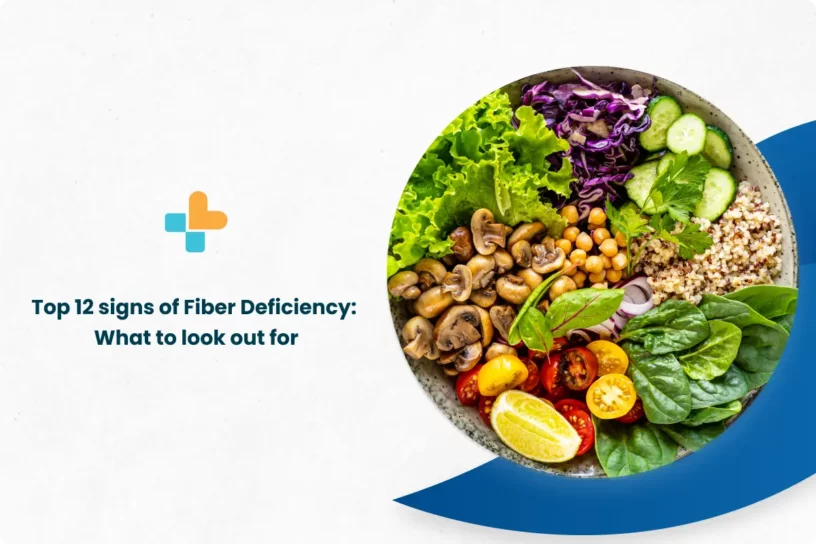Till now, everyone must have heard that consuming a balanced diet is the key to a healthy and disease-free life. Now, seven factors compose a balanced diet: fats, proteins, carbohydrates, vitamins, fibers, minerals, and water. If even one component is missing, it can trigger negative implications in the body. Considered as the most underrated component, fibers are found in food items such as legumes, fresh fruits, leafy vegetables, etc. Fibers are incredibly important for a good gut and digestive health. Are you suffering from fiber deficiency symptoms? Read on to know more about the condition and how to prevent it.
What is fiber?
Dietary fibre, sometimes referred to as roughage, is made up of all the components of plant foodstuffs that the body cannot digest. Fiber nearly entirely bypasses the digestive system undigested, in contrast to carbohydrates, lipids, and protein, which are completely processed by the body.
How much fiber do you need per day?
According to the food and drug administration, for an adult on a 2000 calories per day diet, 28 grams of fiber is required to avoid all fiber deficiency symptoms. The figures will vary according to age and gender, such as:
- Children below 18 years: 14-31 grams per day.
- Men below 50 years: 31 to 34 grams per day.
- Women below 50 years: 25 to 28 grams per day.
- Men above 50 years: 28 grams per day.
- Women above 50 years: 22 grams per day.
High-fiber foods:
Meeting the daily fiber requirements is easier than it seems. Including a few fiber foods, as mentioned below, is sufficient:
- Chia Seeds
- Strawberries
- Oats
- Quinoa
- Chickpeas
- Lentils
- Broccoli.
- Bananas.
Fiber deficiency symptoms:
1. Constipation/bloating – Lack of fiber affects the gut health, often triggering inflammation. This leads to bloating/gas from lack of fiber and constipation.
2. Hungry soon after eating – Low-fiber foods break down more rapidly, which leads to a rapid return of hunger.
3. High cholesterol – The amount of cholesterol absorbed into your system might be decreased by soluble fiber. Hence deficiency of fiber may cause cholesterol levels to rise.
4. Haemorrhoids – Low-fiber foods can induce or worsen constipation, which can result in haemorrhoids.
5. Constantly feeling tired and sluggish – A deficiency of fiber leads to improper functioning of the body. Being responsible for regulating blood sugar levels, a fiber-deficient diet may result in a spike in that. Hence causing tiredness all the time.
6. Hard time losing weight – A fiber-rich diet helps you to feel full and thus eat less. In absence of it, managing or losing weight becomes very difficult
7. Blood sugar fluctuations – Fibers help in controlling blood sugar levels, as mentioned before. Hence its deficiency causes blood sugar fluctuations.
8. Developing a dry mouth and/or eyes – Another typical symptom of dietary fiber insufficiency is a dry mouth and eyes. This is due to the fact that a deficiency in fiber can result in dehydration, which can result in these effects.
9. Suffering from abdominal pain or cramps – A typical indicator of a fiber deficit is discomfort and cramping in the abdomen. This is due to fiber’s role in maintaining regularity in the digestive tract and preventing constipation.
10. Experiencing extreme thirst and/or frequent urination – A deficiency of fiber creates an imbalance of electrolytes plus dehydration in the body. This can lead to signs such as extreme thirst or frequent urination.
11. Experiencing frequent headaches or migraines – Inflammation caused by a lack of fiber in the diet can cause these problems or worsen them even more.
12. Experiencing mood swings – Serotonin is a neurotransmitter that affects mood, and fiber aids in controlling its release. So its deficiency has a negative impact on mood leading to mood swings.
Diseases associated with fiber deficiency
Low-fiber diets have been associated with several fiber-deficiency diseases, such as:
- Diabetes.
- Heart Diseases.
- Constipation.
- Haemorrhoids.
- Bowel cancer.
- Obesity.
- Irritable bowel syndrome.
- Breast cancer.
Conclusion:
Most of the diet options in the modern world tend to be low on fiber. However, till now it’s pretty clear that deficiency of fiber leads to multiple problems. It’s important to include lots of fiber in one’s diet, to lead a healthy life.
Are you noticing some fiber deficiency symptoms? Ayu Health has multiple doctors and dieticians, for helping people out. From framing a personalised diet to detecting deficiencies (if any) in the body, every service is provided. Reach out to 636-610-0800 for learning more.
If you need additional resources or would like to speak with a professional, feel free to contact us right away at +91 636-610-0800 or book an appointment on our website. Our expert team is here to assist and support you every step of the way.
Our Hospital Locations
General Surgery Hospitals in Chandigarh | General Surgery Hospitals in Bangalore | General Surgery Hospitals in Jaipur | General Surgery Hospitals in NCR | General Surgery Hospitals in Hyderabad
Our Doctors
General Surgery Doctors in Chandigarh | General Surgery Doctors in Bangalore | General Surgery Doctors in Jaipur | General Surgery Doctors in NCR | General Surgery Doctors in Hyderabad
About the Author

Dr. S. Goel
Dr. S. Goel is a renowned Internal Medicine Specialist currently practicing at Ayu Health, Bangalore. He is a Specialist in Internal Medicine, Diabetes HTN, Paediatric Care, and Family Medicine.




